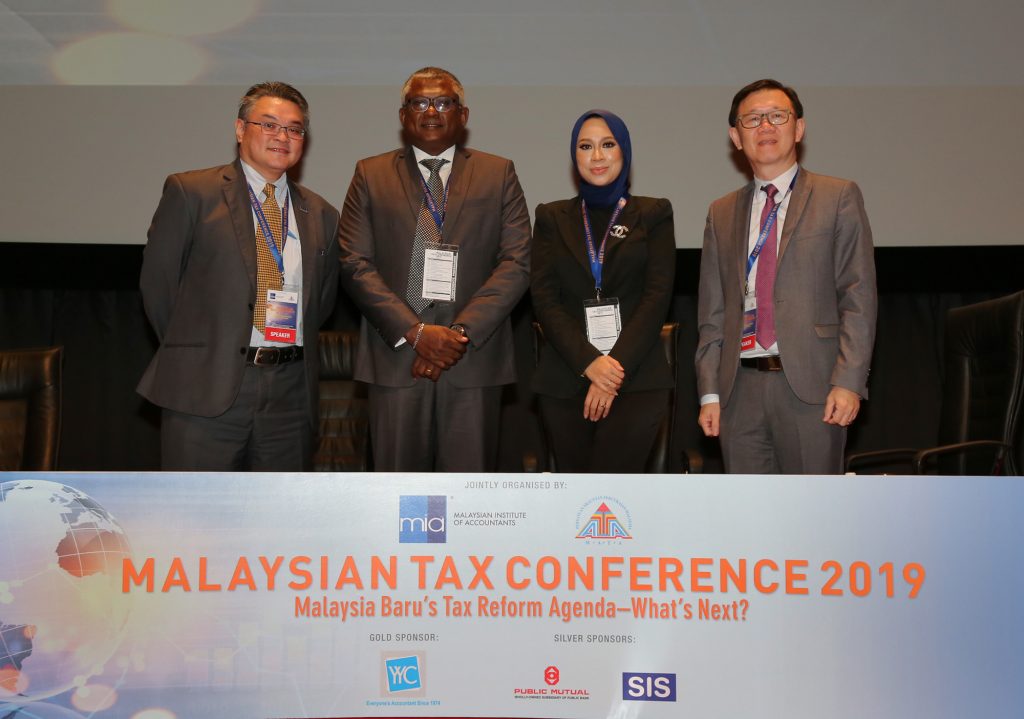By Majella Gomes
Creating a business-friendly tax ecosystem will greatly benefit commerce and the country in general but what exactly does it entail?
It involves multiple dimensions working together in harmony to promote cooperative compliance – the Inland Revenue Board Malaysia (IRBM), individual and corporate taxpayers, practitioners who are the bridge between the IRBM and taxpayers, banks and accounting/tax systems or solutions providers. “All parties must collaborate on a taxation system to move the country forward,” said panel moderator Tai Lai Kok, Member, Taxation Practice Committee, MIA at the session on Creating a Business-Friendly Tax Ecosystem at the Malaysian Tax Conference 2019.
A business-friendly tax ecosystem should make it easy for the taxpayer to report, file and pay taxes. Manual filing used to be the norm but with online or e-filing facilities now available, many processes have been automated, expediting the filing of tax returns. The whole process will ultimately be paperless, thus removing the need for storage as well.
Improving Efficiency and Effectiveness
Reforms – legislative, standards, and operational processes to name a few – are key to building this business-friendly tax ecosystem.
“Malaysia’s new tax reforms are aimed at making the environment fairer, more competitive and efficient,” said Lee Heng Guie, Executive Director, Socio-Economic Research Centre (SERC). He added that Malaysia experienced a drop in direct taxes because of a decline in oil prices worldwide in recent years. Indirect taxes increased but revenue buoyancy was trending lower.
Anand Chelliah, Managing Partner, Tax Services, Baker Tilly Malaysia said, “Key drivers of a good tax system include good corporate governance and transparency. Government corruption, leakages, wastage and illegal outflows have to be nipped in the bud.” Incentives also need a relook, as some of these have overstayed their utility and are no longer relevant. These may be hindering rather than enhancing productivity.
Leakages still abound and despite improved processes, tax collection is not as efficient as it should be. Malaysia’s tax burden is the third highest in ASEAN and the country’s tax base is narrow in relation to its population, so there is a need to broaden the tax base and increase indirect taxes. Key concerns include how to meet the GST-SST revenue shortfall, and easing consumers’ tax burden in view of rising prices. “The outcomes of taxing consumption are better than taxing revenue,” conceded Tai. “The current SST environment is very narrow. The public is not better off with SST. Prices have not decreased as expected.”

Although the panellists commended ongoing efforts to reshape the current tax framework, Chelliah noted that “there are still too many rules and criteria to fulfil,” said Chelliah “Incentives are good but tedious to apply for. MNCs especially want certainty, rule of law, efficiency, fast turnaround time and transparency.” A “smart” tax system, ideally, will be able to integrate tax agents and authorities, review processes, be automated, and offer real-time data. However, the availability of so much data creates another problem of data confidentiality and security.
The divergence between MFRS accounting and tax reporting also needs to be addressed to improve efficiency. A tax ecosystem that works will see fewer accounting divergences and more alignment with accepted standards like MFRS. “Authorities need to close the gap by adhering to generally accepted accounting practice,” recommended Chelliah.
IRBM’s Response
The IRBM recognises that simpler, less complex structures will enable taxes to “move with the economy” resulting in less paperwork and less documentation which could in turn help plug leakages and improve transparency.
In its efforts to improve, the IRBM has streamlined online tax filing and payment, shortened tax number registration time, upskilled its staff, conducted tax clinics, increased its media outreach and become more customer service-oriented.
The IRBM does recognise the need to build trust and instil taxpayer confidence in the system, said Dr Rasyidah Che Rosli, Principal Assistant Director, Tax Operation Department, IRB Malaysia. “We want to help the taxpayer with compliance,” she said. “But we do need the support of all to improve service delivery.”







